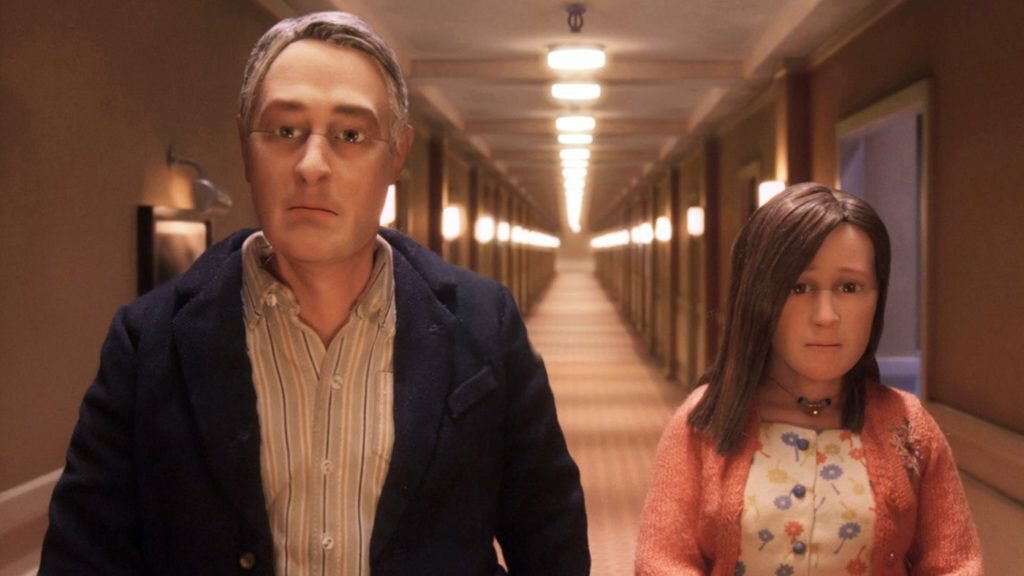 Like most everything Charlie Kaufman does, this is so wrong yet so right. The sad and simple story could come from Updike, or maybe Dreiser, or, if it were a little funnier and not so very American, from Chekhov. The author of a half-baked but successful book on marketing arrives in Cincinnati (starring as the epitome of flyover country: “See the zoo!” “Try the chili!”) to give a paid lecture to a convention of phone bank managers. He’s an utterly typical disappointed mid-life crisis type, unhappy with his perfectly fine family, desperate to feel like he’s still attractive. He calls up an old flame who lives in town and invites her for a drink; when he propositions her, she rightly chews him out and leaves. Desperate, he hooks up with a naive telemarketer who sees him as a celebrity: just his type. After they fool around, he gets histrionic and hyperbolic and decides she’s the love of his life, he’s leaving his wife, but of course she isn’t and he doesn’t. There’s a little bit more — some kind of paranoia about invisible forces pulling strings in the basement — but that’s just normal Kaufman neurotic epiphenomena. It’s all pretty straightforward, right? Sure it is.
Like most everything Charlie Kaufman does, this is so wrong yet so right. The sad and simple story could come from Updike, or maybe Dreiser, or, if it were a little funnier and not so very American, from Chekhov. The author of a half-baked but successful book on marketing arrives in Cincinnati (starring as the epitome of flyover country: “See the zoo!” “Try the chili!”) to give a paid lecture to a convention of phone bank managers. He’s an utterly typical disappointed mid-life crisis type, unhappy with his perfectly fine family, desperate to feel like he’s still attractive. He calls up an old flame who lives in town and invites her for a drink; when he propositions her, she rightly chews him out and leaves. Desperate, he hooks up with a naive telemarketer who sees him as a celebrity: just his type. After they fool around, he gets histrionic and hyperbolic and decides she’s the love of his life, he’s leaving his wife, but of course she isn’t and he doesn’t. There’s a little bit more — some kind of paranoia about invisible forces pulling strings in the basement — but that’s just normal Kaufman neurotic epiphenomena. It’s all pretty straightforward, right? Sure it is.
EXCEPT EVERYONE IS A PUPPET.
There’s some other formalist funny business going on here — many of the characters (again, PUPPETS) have the same faces and voices, which I guess symbolizes something about something — but the overwhelming main thing about this movie is, obviously and thunderously, that everyone is a puppet, causing the viewer to have to ask him/herself at every single moment, regardless of how touching or pathetic or funny whatever is happening on screen may be, “Why is this happening at all?!”
It’s one thing to do the Svankmajer or Brothers Quay stop-motion puppet thing with texts like Alice in Wonderland, Faust, or The Street of Crocodiles — texts congenial to the grotesque and uncanny — but why would you shoot this sad little Updike story like this? People, it took two years! Some days they shot for twelve hours to get 12 frames! That’s half a second of screen time!
So inevitably and quite deliciously, the movie possesses an extraordinary Verfremdungseffekt. The story presents itself as pure naturalism; the ostentatious, even aggressive display of artifice completely thwarts any possibility of submitting to the narrative dream.
How does that insistence on the artificial map onto the movie’s narrative, and vice-versa? I think there’s a reading to be made there, something along the lines of the way that the customer service guru character is a sort of construct unto himself, a surface alluding to depth without possessing any, but I’m still in a swoon and not inclined just now to unpack this any further. Wonderful night at the movies.